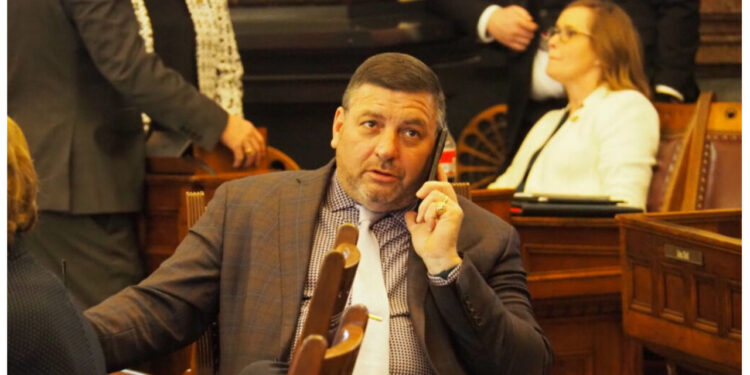Topeka Senator Richard Kloos, who also serves as pastor of the coffee shop and thrift store named God’s Storehouse, had his attempt to prevent the Internal Revenue Service from accessing the banking records of God’s Storehouse rejected by the 10th Circuit U.S. Court of Appeals. This decision came during an investigation into the tax-exempt status and potential tax evasion of the nonprofit corporation. (Tim Carpenter/Kansas Reflector)
A federal appellate court has dismissed state Sen. Richard Kloos’ bid to block an Internal Revenue Service (IRS) summons for bank records pertaining to a Topeka coffee shop and thrift store. These establishments are currently under investigation for potential unpaid business taxes, as well as the legal status of a not-for-profit corporation that Sen. Kloos asserts is a church.
Kloos’ lawyers have requested the 10th Circuit of the U.S. Court of Appeals to intervene and block the IRS from obtaining records for accounts associated with God’s Storehouse from Kaw Valley Bank. God’s Storehouse, which was established by Kloos and his wife in 2009, is the subject of the IRS’s investigation. The appeal aims to overturn a previous decision by a U.S. District Court that denied objections to the IRS’s request for access to all Kaw Valley Bank records connected to God’s Storehouse between January 1, 2019, and December 31, 2020.
According to court records, the IRS investigation focused on several concerns related to God’s Storehouse. These concerns included questioning whether the organization operated primarily as a thrift-store business rather than a church. Additionally, there were allegations that God’s Storehouse improperly intervened in Kloos’ successful Senate campaign in 2020. The investigation also looked into whether the coffee shop associated with God’s Storehouse avoided liability for business income taxes. Moreover, it was alleged that wage payments made to the Klooses resulted in unpaid employment taxes. The IRS claimed that the Klooses withheld employment taxes from workers of God’s Storehouse but did not withhold employment taxes on the wages they paid themselves.
God’s Storehouse was not established as a charitable organization under federal law. Instead, the Klooses decided to launch it as a tax-exempt corporation and declared it to be a church.
During the appeal, the Klooses’ legal representative argued that the IRS summons was deemed invalid as the federal government had not met the necessary requirements for examining church records. Furthermore, they asserted that churches were entitled to special protections in the context of audits.
The federal district court determined that the IRS relied on the correct high-level official from the U.S. Department of Treasury to initiate the request for bank documents. The judge in that federal court case highlighted a provision in the Code of Federal Regulations which stated that “records held by a third-party bank are not church records.”
The three-judge panel of the U.S. Court of Appeals has upheld the lower court’s decision, stating that “the relevant statutory language and applicable case law are in agreement.” This means that the IRS has followed federal law in its request for access to bank records belonging to God’s Storehouse. The court further clarified that the IRS’s requirements for initiating church taxation inquiries or examinations do not apply to the third-party summons sent to a Kansas bank.
In a ruling published on Tuesday, a 15-page order dismissed God’s Storehouse’s request to dismiss the summons for Kaw Valley Bank. Additionally, the order granted the IRS’s motion to summarily deny the Klooses’ attempt to hide their banking records. It’s worth noting that the IRS investigation was initiated in February 2021.
According to Ryan Kriegshauser, one of the three attorneys representing God’s Storehouse, the appellate court’s decision has allowed the IRS to take advantage of a procedural loophole in order to strip churches of their constitutional protections.
In the same case, he also highlighted the conclusion made by a federal magistrate judge that Congress should take into account the IRS’s ability to bypass federal safeguards provided to churches.
“Our client remains firmly dedicated to upholding religious liberties and will carefully assess this opinion with our client to determine the best course of action,” he stated.
Kloos, a resident of Berryton, made an unsuccessful bid for the position of Kansas governor as an independent candidate. Despite this setback, he managed to secure a Senate seat in 2020 by defeating the longest-serving member of the Kansas Legislature. Currently, Kloos is actively seeking reelection in 2024. Additionally, his spouse, Pennie Kloos, is campaigning for a Topeka seat in the Kansas House, which is currently held by Democratic Rep. Virgil Weigel, a member of the Topeka Democratic party.
The Kansas Reflector reports that a U.S. federal court has ordered the release of bank records as part of an IRS investigation into a Kansas state senator.
